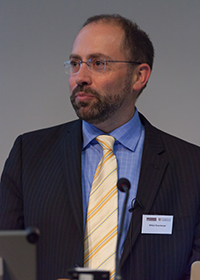
William Rosenberger, chair of Mason Engineering's statistics department, will deliver his Armitage Lecture at Mason on February 9 at 11 a.m. in the Johnson Center's Gold Room.
Mason Engineering’s Department of Statistics conducts cutting-edge research on the use of randomized clinical trials in medicine.
Such studies can be a matter of life and death, says the department’s chairman William Rosenberger, a university professor. He addressed the importance of randomization in clinical trials at the prestigious Armitage Lecture at the University of Cambridge in November 2017.
He’ll give the same speech at Mason, “Randomization: The Forgotten Component of the Randomized Clinical Trial,” at 11 a.m. on Friday, February 9 in the Johnson Center’s Gold Room. It’s part of the R. Clifton Bailey Seminar Series.
Rosenberger says he was surprised and honored to be selected as the 15th Armitage Lecturer, which is named after Peter Armitage, 93.
“Professor Armitage is one of our heroes in statistics,” Rosenberger says. “He is one of the pioneers in several areas of statistics, including sequential analysis and the design of clinical trials, and he’s the author of a very good textbook on the design of medical studies.”
In the fall, Rosenberger spent two weeks at the medical research unit at Cambridge where he worked with faculty and post docs. His time there culminated with his Armitage Lecture at a one-day conference. “It was one of the thrills of my academic career,” he says.
Much of the material for the speech came from Rosenberger’s two books on the topic, Randomization in Clinical Trials: Theory and Practice, and The Theory of Response-Adaptive Randomization in Clinical Trials.
He says the importance of randomization has been lost in many research studies today. “Randomization is randomly assigning patients to treatment arms in a clinical trial. There are number of reasons we do that. One is to eliminate bias. It also allows us an assumption-free test of whether the treatment is effective or not.”
At the lecture in Cambridge, Rosenberger says he got excellent questions from several well-known statisticians in the audience.
"Professor Armitage wasn’t able to attend the lecture, but he watched it later on video," Rosenberger says. “I got a very nice email from him afterward that said he had watched the videotape and he congratulated me.”
